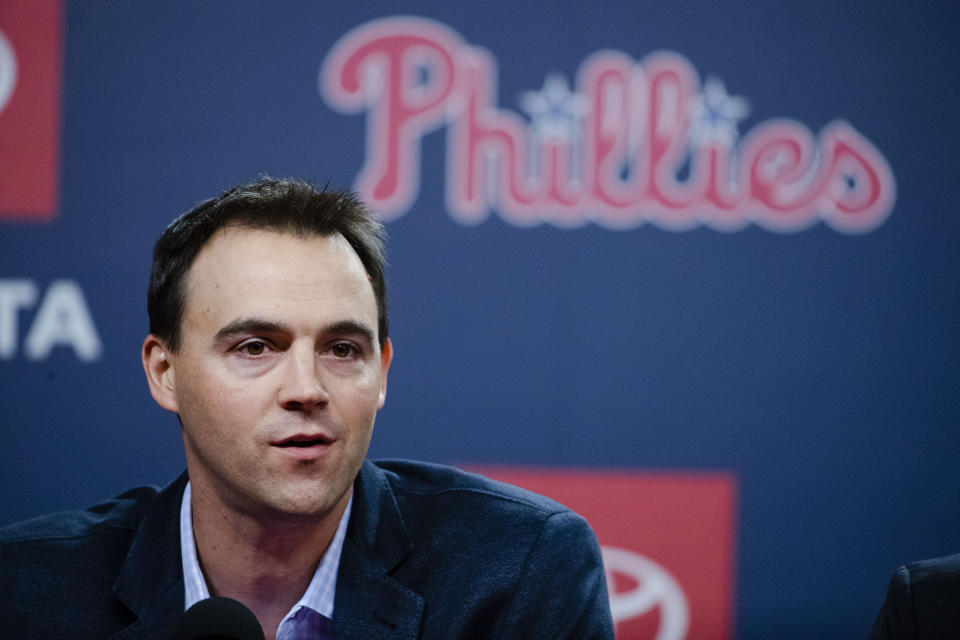Wins and losses don't tell general managers' full stories, but they do explain the firings
A high school player and first-round draft pick signed hours before his first college biology or Latin or dance class more than a few years back and soon was at a big-league ballpark wearing a jersey he’d never earn. He seemed a nice young man and I remarked as such to the general manager next time I saw him, and the general manager replied, “Yeah, let me know how that goes.”
“What do you mean?”
“Oh,” he said, “I’m sure I’ll be long gone by the time he gets here.”
Not so much fatalistic as realistic, the general manager was wrong in that the player never did get “here,” but also correct in that the general manager wouldn’t have been “here” even if the kid had sorted himself — or his swing — out. He was fired within the year.
He was good at his job, which did not matter. He cared deeply, which mattered less.
What mattered was his team did not win often enough, which is different than not being good at the job, even if that’s the perception of the whole job and then certainly the expectation.
See, they’re all going to build the farm system and grow their own players and thread out the brilliant free agent signings and create a winning culture and clean up after the parade. Says so right there on their résumés. Then they’ll say goodbye to their families and sleep four hours a night and hunt good players and, sure, make some money, but also have the entire process go as well as it possibly could right up until three elbow ligaments give out over a month and then they’re terrible at their job. Then the owner falls in love with some agent’s binder and they spend the next three years borrowing from the international budget to put pitchers on the mound, because the game requires at least one every night, and maybe that gets them through a year or two, barely, but one morning they wake up and they haven’t signed a significant international player in three years, because they didn’t have the money (or the scouts), because there’s a first baseman making $25 million, so the farm system wasn’t built and their own players didn’t grow. Like, at all.
This is not intended as an excuse as much as a description of how it goes sometimes, and in bunches.
The Philadelphia Phillies demoted their general manager, Matt Klentak, on Saturday, days after the Los Angeles Angels fired theirs, Billy Eppler. They’d been hired within three weeks of each other in November 2015. They walked in young, eager and emblematic of what the new general manager looks and sounds like. Not five years later, they packed their offices without a winning season between them, and you can be sure they were good at their jobs — or tried to be — and cared deeply.

But, and here’s the thing, only once in those 10 combined seasons did either one of them field a team that scored more runs than it gave up, which the Angels did in 2017, by a single run. And only once did either have a team ERA in the top half of his league. It’s always the pitching, man.
(Which is why Dave Dombrowski is likely to have his pick of those jobs, not because the same thing hasn’t happened to him, but because he’s built winners and if he’s smart he wears those yo-yo-sized rings into the interviews.)
Klentak had two years remaining on his contract. Eppler had a year left, that the result of a contract extension he’d received just three months before he was fired. Their teams each missed the playoffs year after year after year, which gets harder to explain as it goes. Then arrive at a summer in which more than half the league gets an October pass, and miss again, and have to explain a bottom-10 farm system too, well, you can go ahead and stop watering the plants.
Baseball likes to call itself a results business, as if they all aren’t. But it gets some of the owners past the part where they have to explain an unfortunate hire or their own decisions that contributed to another horrible season or the fact they have no idea why they didn’t win all of their games. (It was the pitching.) (Again.)
These are glorious, miserable, challenging, hopeless, soaring and through-the-wood-chipper jobs that hardly anyone is very good at, or viewed as being very good at, or not for very long.
Matt Klentak and Billy Eppler were hired five years ago to turn failures, perceived failures, into champions. The Angels won 85 games the season before Eppler was hired and haven’t won as many again. The Phillies lost 99 games the season before Klentak was hired and haven’t lost as many since. They’re both out today for probably a thousand reasons. (It was the pitching.)
And also because they didn’t win.
More from Yahoo Sports:

 Yahoo Sport
Yahoo Sport 






































